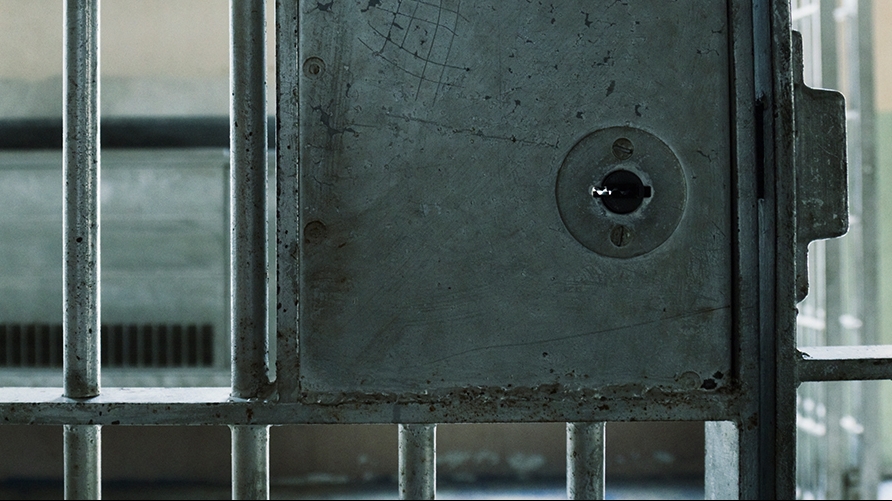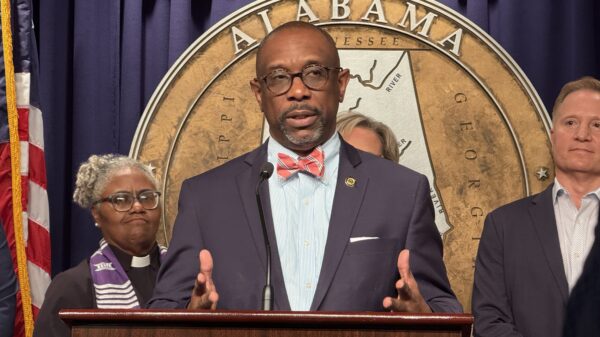By Josh Moon
Alabama Political Reporter
Joined by a group of sheriffs and county lawmakers, Reps. Allen Farley and Johnny Mack Morrow introduced the outline for a new prison construction bill on Wednesday.
That bill would rely on sheriffs and local jails to house thousands of prisoners and limit costs on construction by focusing primarily on renovations and new facilities for counties.
“It’s the most common sense approach to this issue that I’ve seen,” said Rep. Mike Holmes, who attended the press conference. “It just makes so much more sense.”
The goal of the bill, which Morrow has discussed often, is to do address several points of concern he has with the Senate bill. That bill would allocate $250 million to build a prison, but only after two counties agree to build two other prisons. The State would lease those prisons.
But Morrow pointed out a few problems. That bill doesn’t consider the steady decline in prison population currently ongoing and expected to continue.
“You’re talking about having these mega-prisons,” he said, “but it looks like you’re going to have a bunch of empty beds.”
More importantly, Morrow said, is that the cost of the bill sponsored by Sen. Cam Ward leaves the State little wiggle room to pay for mental health costs and a shortage of corrections officers. The State could be required by a federal court to address both issues, paying millions of dollars to do so.
Morrow said the bill being carried by Farley would leave funds for those issues, because it spreads the costs out over the State and over a longer period of time.
An information sheet Morrow provided to the media shows the general structure of the bill. It would move 1,000 inmates, likely female inmates, to the private prison facility in Perry County, which the state would have to purchase.
Up to 500 inmates could be eligible for electronic monitoring programs. Another 3,000 could be housed in county jails. The 300 terminally ill and physically handicapped prisoners could be moved to a facility utilizing Medicaid.
“The question then becomes this: Do we have adequate State facilities to house 15,200 inmates?” Morrow asks in his handout. “If the answer is no, then we need to begin immediately with prison renovations to achieve this goal by 2020.”
Morrow also noted that by borrowing $800 million to build prisons – a proposal he said he’s confident will return before the session ends – the State would obligate taxpayers to pay $75,000 per prisoner, even at current inmate levels, to repay that loan.
The Governor’s office, not surprisingly, disputes those figures and called the entire plan “flawed.”
Wesley Helton, the Governor’s Legislative Director, said Farley’s bill will cost the State more than $54 million in new money annually.
The largest part of those costs would come from the proposal to house 3,000 inmates in county facilities at a cost of $30 per day. Helton said the costs would transfer equally from State-run facilities if the inmates are shifted to county jails.
“You still have a facility to operate, a guard to pay, power bills, all the rest at that (state) facility,” Helton said. “The number is flawed because of that. It’s more along the lines of about $7 – basically, the cost of food.”
However, supporters of the Farley bill say that’s a low estimate. If one-sixth of the state prisoners were immediately moved, there would be more savings than just on food. It could lower officer requirements and overtime, cut down on fights that wind up costing the State money for medical care and cut the costs of supplies and clothing.
However, Morrow and Farley both said the bill, in its current form, wasn’t perfect and that they’re willing to listen to anyone with ideas.
“We just want to address the problems and save people money if we can – that’s my only interest in this,” Morrow said.
Sen. Cam Ward, the sponsor of the Senate’s bill, has said he’s willing to talk and accept any ideas that work.




















































